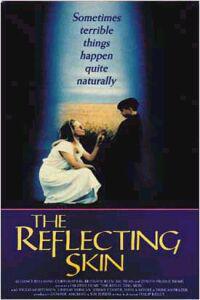 A gorgeously scenic yet profoundly grim and disturbing 1990 film that, in direct contrast to most movies of the period, has improved with age. THE REFLECTING SKIN, a British-Canadian production, was made back-to-back with the Canuck comedy PERFECTLY NORMAL, which was widely thought to be superior. I’m willing to bet there are few who remember the latter film, whereas THE REFLECTING SKIN has amassed a sizable, and ever-expanding, cult following.
A gorgeously scenic yet profoundly grim and disturbing 1990 film that, in direct contrast to most movies of the period, has improved with age. THE REFLECTING SKIN, a British-Canadian production, was made back-to-back with the Canuck comedy PERFECTLY NORMAL, which was widely thought to be superior. I’m willing to bet there are few who remember the latter film, whereas THE REFLECTING SKIN has amassed a sizable, and ever-expanding, cult following.
It was the filmmaking debut of England’s Philip Ridley, a successful screenwriter (of THE KRAYS) and novelist (of CROCODILIA and IN THE EYES OF MR. FURY). Other budding talents included Viggo Mortensen in one of his first-ever starring roles, the young Jeremy Cooper (who hasn’t been heard from much since) in his film debut, and the film’s U.S. distributor Miramax, which in 1990 was still coming into its own. As for Ridley, he went on to make THE PASSION OF DARKLY NOON and HEARTLESS.
The time is the early 1940s. Nine-year-old Seth Dove lives in a depressed prairie town. Seth’s troubles begin when he unwisely explodes a frog in the presence of Dolphin Blue, a witchy woman who lives nearby. Pressured by his mother to apologize to Dolphin, Seth enters her home and confronts her. Far from being appalled by what Seth did, the old woman seems to approve of his actions, gleefully relating how as a youngster she used to set cats on fire. She also claims to be a 200-year-old vampire.
Seth is understandably unnerved by this news, but he’s got other worries. His mother is a sadistic bitch who tortures Seth by forcing him to drink gallons of water until his stomach nearly explodes, while his father is a repressed homosexual who spends his days moping around the family gas station. There’s also a roving band of teenaged psychos who have a bad habit of snatching up local children—Seth isn’t kidding when he claims his friends are “all dead.”
One night Seth’s father immolates himself and the next day his older brother Cameron returns home from fighting overseas. But Cameron is aloof and distracted, and immediately becomes attracted to Dolphin Blue. Seth believes Dolphin is vampirizing his brother, and confides his troubles to a dead fetus. But it’s all to no avail, as things only grow steadily grimmer for everyone involved.
THE REFLECTING SKIN can be considered an anti-nostalgia piece, dramatizing a childhood that’s anything but pleasant. The cinematography by Dick Pope is lush, with a burnished Norman Rockwell sheen, yet the subject matter is far from Rockwell-esque.
The camerawork is bold and imaginative, and the production design has a darkly surreal tinge, with its wooden houses set amid endless prairies (this film can be viewed as a precursor of sorts to Terry Gilliam’s TIDELAND). The performances, particularly that of Lindsay Duncan as the alluring Dolphin Blue, admirably complement the imaginative bravura of Philip Ridley’s screenplay.
Ultimately the film is one of moments. Some of those moments admittedly add up to very little (such as the nuns who for some reason cluck like chickens), but most lodge in the mind in the manner of a particularly disquieting dream. They include the exploding frog in the middle of a road that sets the narrative in motion; a conflagration seen through a POV shot of fingers over the camera lens; Seth running to greet his long-lost brother through a vast wheat field with an American flag draped over his back; the unforgettable final shot of an at-the-end-of-his-tether Seth, howling in anguish at the setting sun. A powerful film, certain to leave a mark.
Vital Statistics
THE REFLECTING SKIN
Miramax Films/British Screen
Director: Philip Ridley
Producers: Dominic Anciano, Ray Burdis
Screenplay: Philip Ridley
Cinematography: Dick Pope
Editing: Scott Thomas
Cast: Viggo Mortensen, Lindsay Duncan, Jeremy Cooper, Sheila Moore, Duncan Fraser, David Longworth, Robert Koons, David Bloom, Evan Hall, Codie Lucas White, Sherry Bie, Jason Wolfe, Dean Hass, Guy Buller
